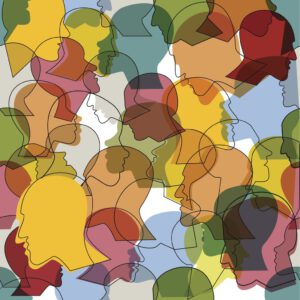One of the few issues a majority of Americans agree on is that race relations are not getting better — they are getting worse, according to a new survey on attitudes about race and genetics done in a collaboration between researchers at 23andMe and Northwestern. But the survey conducted by Center for the Study of Diversity and Democracy also captured a promising transformation in thinking about race — a change possibly influenced by young people who no longer identify in binary terms, as well as the advent of at-home DNA testing.
“We’re a hell of a lot better off than I thought we were,” said Al Tillery, Jr, Ph.D., an associate professor and associate chair of Northwestern University’s department of political science who led the study. “What I expected … is that about two-thirds of Americans would believe that race and genetics are tightly bound together. We actually found the opposite. Only about a third of Americans nationally see a strong connection.”
Almost half of Americans said that while your genetics plays a role in determining racial identity, it doesn’t determine it, according to the survey.
The science also supports this nuanced understanding of racial identity. In fact, what we think of as race is largely a “social construct,” not a biological one.
For Prof. Tillery, it was encouraging to see that Americans have absorbed this concept, especially during these divisive times. What the science shows is that genetic differences are not significant enough to support biological definitions of racial categories. That doesn’t mean there are not genetic variations that reflect different ancestral groups, but what people think about when they think about race usually focuses on skin color, which, although heavily influenced by genetics, is controlled by a tiny fraction of our genome. Any two individuals are 99.5 percent genetically similar. While those minuscule differences mark what makes us each unique, focusing on them exclusively may exacerbate social tensions.
Prof. Tillery’s comments on the new survey were part of a broader discussion about race that played out during the second episode of a new iHeart radio podcast “Spit — Conversations on DNA.”
Hosted by the comedian and writer Baratunde Thurston, the podcasts will be discussions with some of the most influential thinkers on the impact of so many people using genetic testing to learn about themselves. Joining Professor Tillery on this second episode was the musician Wyclef Jean. In the first episode, 23andMe’s CEO and Co-Founder Anne Wojiciki joined Baratunde for a wide-ranging and entertaining conversation about genetics on episode one.
But the discussions with Wyclef and Prof Tillery focused on this new survey by Northwestern, a survey that marks new territory. Polls measuring attitudes about race relations, an already contentious subject, are nothing new, but this one is perhaps the first to look at attitudes towards race and genetics. Discussions of race and genetics have a long and troublesome history. One in which the science has been misused for racist purposes.
“I give (23andMe) a lot of credit for just wanting to know,” said Prof. Tillery “They came to me and said, ‘You know about race relations, how can we design a study where we can see what Americans think about the relationship between genetics and race?’”
And the point wasn’t just to look at race and genetics, but also whether testing might be making matters better or worse. Some critics of DNA testing argue that it reinforces perceptions of racial differences. They point to something called “reification theory,” a concept that in this context means DNA testing solidifies people’s definitions of racial categories, making them seem more concrete. But there isn’t much evidence to support this. It’s possible that testing does the opposite by reminding people of how mixed we all are, but the evidence for either theory is not there yet. 23andMe hopes to do follow-up surveys to learn more.
“I’m excited by how the results of this survey can kick start a frank conversation about genetics and racial identity,” said Joanna Mountain, 23andMe’s Senior Director of Research, who was also involved in designing the study.
During the podcast, Baratunde got beyond what was in the study and talked with Wyclef about why, despite any two people being 99.5 percent genetically similar, many of us “spend a lot of time focusing on that 0.5 percent difference.”
“(I)t’s very interesting just listening to the overall statistics,” Wyclef said. “I would say that traveling probably half of the globe, I think it’s something that everyone should know. We have so much more in common than you could even imagine.”
Listen to this whole riveting discussion on episode two of “Spit — Conversations on DNA” or check out other episodes as they come online. We will be sharing more on this new Race and Genetics Survey in the coming weeks.




